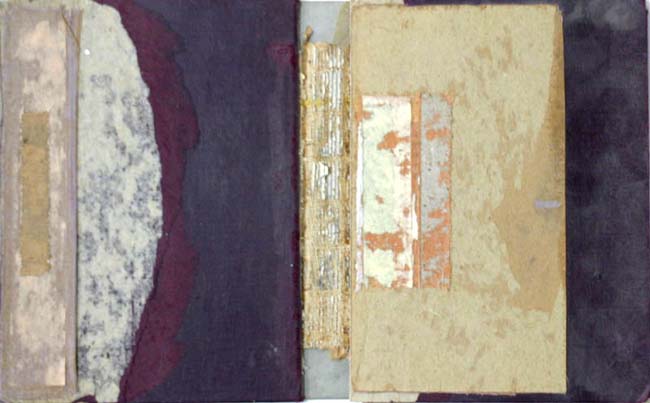Burning Books in Baghdad
 Qassim Septi, collage with book parts, 2003
Qassim Septi, collage with book parts, 2003ca. 8 x 15 in., Hewar Gallery
The Bookseller's Story, Ending Much Too Soon
By Anthony Shadid
Washington Post Foreign Service
Monday, March 12, 2007
It was a summer day in 2003, when Iraq was still filled with the half-truths of occupation and liberation, before its nihilistic descent into carnage. Mohammed Hayawi, a bald bear of a man, stood in his shop, the Renaissance Bookstore, along Baghdad's storied Mutanabi Street.
On shelves eight rows high rested books by communist poets and martyred clerics, translations of Shakespeare, predictions by Lebanese astrologers, a 44-volume tome by a revered ayatollah and a tract by the austere medieval thinker Ibn Taimiyyah. Dusty stacks spilled across the cream-color tile floor, swept but stained with age. In those cramped quarters, Hayawi tried to cool himself with a fan, as perspiration poured down his jowly face and soaked his blue shirt.
We had met before the American invasion, and nearly a year later, he almost immediately recognized me.
"Abu Laila," he said, using the Arabic nickname taken from the name of a person's child.
He then delivered a line he would repeat almost every time we saw each other over the next few years. "I challenge anyone, Abu Laila, to say what has happened, what's happening now, and what will happen in the future." And, over a thin-waisted cup of tea, scalding even on this hot day, he shook his head.
A car bomb detonated last week on Mutanabi Street, leaving a scene that has grown familiar in Baghdad, a collage of chaotic images, disturbing in their brutality, grotesque in their repetition. At least 26 people were killed. Hayawi the bookseller was one of them.
Unlike the U.S. soldiers who die in this conflict, the names of most Iraqi victims will never be published, consigned to the anonymity that death in the Iraqi capital brings these days. Hayawi was neither a politician nor a warlord. Few beyond Mutanabi Street even knew his name. Yet his quiet life deserves more than a footnote, if for no other reason than to remember a man who embraced what Baghdad was and tried to make sense of a country that doesn't make sense anymore. Gone with him are small moments of life, gentle simply by virtue of being ordinary, now lost in the rubble strewn along a street that will never be the same.
After his death, I thought back to our conversation on that summer day. As he often did, Hayawi paused after an especially vigorous point and dragged on his cigarette. He ran his hand over his sweaty cheeks. "Does this look like the face of 39 years?" he said, grinning. He then knitted his brow, turning grimmer. "We don't want to hear explosions, we don't want to hear about more attacks, we want to be at peace," he told me. He always had dark bags under his limpid eyes, whether or not he had slept. "An Iraqi wants to put his head on his pillow and feel relaxed."
Peace be with you, Hayawi.

0 Comments:
Post a Comment
<< Home